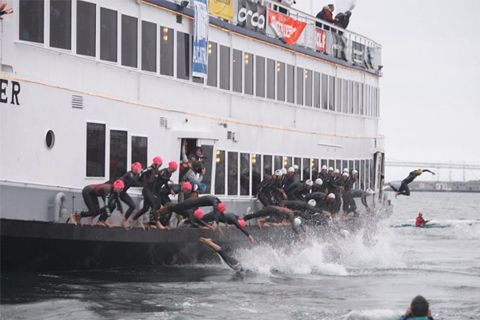Swim conditions make Escape from Alcatraz Triathlon difficult and deadly this year

Austin has a very robust triathlon community and so it’s no surprise that a contingency of locals headed to California for last weekend’s Escape from Alcatraz Triathlon. A destination event is always fun and this particular triathlon has several interesting and unique aspects. One is that the 1.5-mile swim starts at the famed Alcatraz prison. It was the cold, rough waters, strong current, and sharks that supposedly made the federal prison incapable of escape. Following the swim is an 18-mile bike ride through beautiful San Francisco and an 8-mile run through Golden Gate Park. The novelty of the swim combined with the beauty of the Bay Area, make it a great option for those who enjoy triathlon.
Julie Herron, a local triathlete with multiple Ironman finishes and experience at this particular triathlon, finished the race and returned to Austin to report that the swim conditions were especially brutal this year. At the race start, the air temperature was 51 degrees; the water temperature was announced to be 50 degrees (for a frame of reference, Barton Springs hovers at approximately 68 degrees). This is quite cold for a triathlon and special circumstances will mean that USA Triathlon rules prohibiting booties or caps can be waived; in some circumstances, the swim portion may be cancelled due to cold temperatures (in 2008, Ironman Coeur d’Alene discussed the option of cancelling the swim section due to water temperatures in the low 50s, the results of an unusual amount of mountain run-off; the water temperature reached 58 degrees and the swim was held). Herron was prepared for cold water and still found the conditions daunting.
“Even though I have done the race before, the swim was 1,000 times worse! Choppy. Swirling waves so high that I couldn't sight well at all,” recalledHerron. “I was pretty damn scared during the entire swim. I won't lie. If it weren't for the kayaker yelling when to swim to each landmark as we swam closer and closer, I would have asked for help. I thought of getting pulled out many times. The first time I almost raised my hand was when I couldn't feel my legs. And my hands were so frozen I couldn't feel when they went in and out if the water. I have never been so cold.”
Herron’s husband was there to support and he had become concerned for her safety when the surf picked up as the boats originally went out to ferry the triathletes to the start. After she’d finished, he told Herron that boats were pulling up, dropping off as many as 20 athletes at a time who had opted out of the swim portion. Herron felt these people had made a wise decision, as even the swim exit was dangerous due to the strong surf and proximity of rocks. “Lots of people were giving up and opting for the safe way out of the water. Smart people! I'm just too stubborn,” explained Herron. “The swim is the whole point of this race. I had to see if I could [do it]. Deep Eddy did help me mentally know I could swim through the misery…. Other than being mentally prepared, there is no way to prepare for those swim conditions. It was insane!”
The rest of the triathlon proved to be enjoyable; the bike portion was “nice, scenic. Along the coast, surfers were having a great day” and the run was uneventful. Herron took pictures and enjoyed the rest of the event, as she knew that the difficult swim section had skewed her results for the triathlon.
Herron is simply thankful to have finished, as the difficult start claimed one life. Apparently suffering from a heart attack, Austinite Ross Ehlinger, 46, was pulled from the water by triathlon support crews who were unable to revive him. Ehlinger, like so many Austin triathletes, was traveling with family and friends for the destination race, one the experienced triathlete had completed before. The shock to the closely-knit athletic community here has been great, and many in Austin and the Westlake area where Ehlinger was so active are in mourning. Austin Fit Magazine’s condolences go out to his family and loved ones.
While deaths in triathlons are rare, they most often occur in the swim portion and researchers are still working to uncover why this is so and how best to avert these tragedies. For a look at some of the research, this Scientific American article from 2011 gives some basic information about a study that looked at cardiac events.
As Herron stated, these were unusual conditions that could not be prepared for and the swim was difficult for all involved. “[My husband] has expressed he was really scared for me,” she said. “Although I would like to do this race again, I'll have to wait until his memory fades. He has asked that I not do it again. We shall see.”
See AFM’s related story on another Alcatraz triathlon here.






